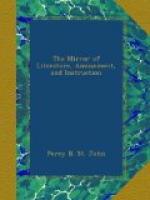If, traveller, you search for the footsteps of the ancient Romans, here you may behold them. For here their most celebrated ways, crossing one another, extend to the utmost boundaries of Britain; here the Vennones kept their quarters; and at the distance of one mile from hence, Claudius, a certain commander of a cohort, seems to have had a camp, towards the street, and towards the foss a tomb.
The ground here is so high, and the surrounding country so low and flat, that it is said, fifty-seven churches may be seen from this spot by the help of a glass.
The following judicious remarks on the customs, mariners, and dialects of the common people of this district by Mr. Macauley, who published a history of Claybrook, may be amusing to many readers.—The people here are much attached to wakes; and among the farmers and cottagers these annual festivals are celebrated with music, dancing, feasting, and much inoffensive sport; but in the neighbouring villages the return of the wake never fails to produce at least a week of idleness, intoxication, and riot. These and other abuses by which those festivals are grossly perverted, render it highly desirable to all the friends of order and decency that they were totally suppressed. On Plow Monday is annually displayed a set of morice dancers; and the custom of ringing the curfew is still continued here, as well as the pancake bell on Shrove Tuesday. The dialect of the common people is broad, and partakes of the Anglo-Saxon sounds and terms. The letter h comes in almost on every occasion where it ought not, and it is frequently omitted where it ought to come in. The words fire, mire, and such like, are pronounced as if spelt foire, moire; and place, face, and other similar words, as if spelt pleace, feace; and in the plural you sometimes hear pleacen, closen, for closes, and many other words in the same style of Saxon termination. The words there, and where, are generally pronounced theere and wheere; the words mercy, deserve, thus, marcy, desarve. The following peculiarities are also observable: uz, strongly aspirated for us; war for was; meed for maid; faither for father; e’ery for every; brig for bridge; thurrough for furrow; hawf for half; cart rit for cart rut; malefactory for manufactory; inactions for anxious. The words mysen and himsen, are sometimes used for myself and himself; the word shoek is used to denote an idle worthless vagabond; and the word ripe for one who is very profane. The following phrases are common, “a power of people,” “a hantle of money,” “I can’t awhile as yet.” The words like and such frequently occur as expletives in conversation,




